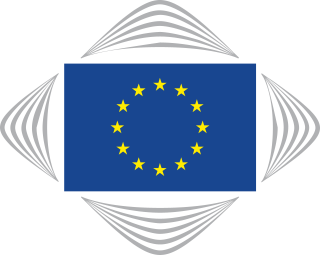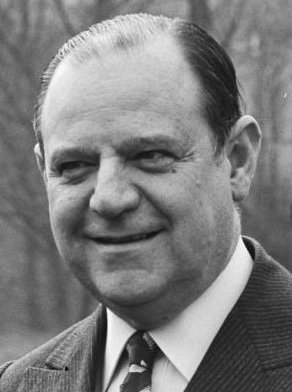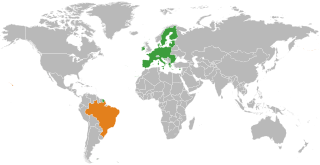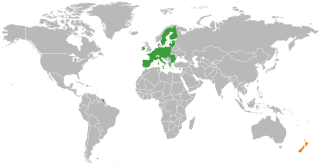
The European Council is a collegiate body that defines the overall political direction and priorities of the European Union. The European Council is part of the executive of the European Union (EU), beside the European Commission. It is composed of the heads of state or of government of the EU member states, the President of the European Council, and the President of the European Commission. The High Representative of the Union for Foreign Affairs and Security Policy also takes part in its meetings.

The European Commission (EC) is the primary executive arm of the European Union (EU). It operates as a cabinet government, with 27 members of the Commission headed by a President. It includes an administrative body of about 32,000 European civil servants. The commission is divided into departments known as Directorates-General (DGs) that can be likened to departments or ministries each headed by a Director-General who is responsible to a Commissioner.

Franco Maria Malfatti was an Italian politician who served as the third president of the European Commission from 1970 to 1972. He served at Italian level as Italian Minister of Foreign Affairs from 1979 to 1980 and Italian Minister of Education from 1973 to 1978.

The European Committee of the Regions (CoR) is the European Union's (EU) assembly of local and regional representatives that provides sub-national authorities with a direct voice within the EU's institutional framework.

Sicco Leendert Mansholt was a Dutch farmer, politician and diplomat of the Social Democratic Workers' Party (SDAP) and later the Labour Party (PvdA), who served as the fourth president of the European Commission from 1 March 1972 until 5 January 1973.

Raymond Octave Joseph Barre was a French politician and economist. He was a Vice President of the European Commission and Commissioner for Economic and Financial Affairs under three presidents. He later served as Prime Minister under Valéry Giscard d'Estaing from 1976 until 1981. As a candidate for the presidency in 1988, he came in third and was eliminated in the first round. He was born in Saint-Denis, on the French island of Réunion, and then still a colony.

The Organization of the Black Sea Economic Cooperation (BSEC) is a regional international organization focusing on multilateral political and economic initiatives aimed at fostering cooperation, peace, stability and prosperity in the Black Sea region. It traces its origin to 25 June 1992, when Turkish President Turgut Özal and leaders of ten other countries gathered in Istanbul and signed the Summit Declaration and the "Bosphorus Statement". BSEC Headquarters – the Permanent International Secretariat of the Organization of the Black Sea Economic Cooperation – was established in March 1994, also in Istanbul.

Relations between the European Union (EU) and Moldova are currently shaped via the European Neighbourhood Policy (ENP), an EU foreign policy instrument dealing with countries bordering its member states.

Jean-François Deniau was a French politician, diplomat, essayist and novelist. Until 1998, he was a member of the Union for French Democracy (UDF).
The Mansholt Commission is the European Commission that held office from 22 March 1972 to 5 January 1973. Its President was Sicco Mansholt.

The Rey Commission is the European Commission that held office from 2 July 1967 to 30 June 1970. Its president was Jean Rey.

The history of the European Communities between 1958 and 1972 saw the early development of the European Communities. The European Coal and Steel Community (ECSC) had just been joined by the European Atomic Energy Community (Euratom) and the European Economic Community (EEC), the latter of which soon became the most important. In 1967 the EEC's institutions took over the other two with the EEC's Commission holding its first terms under Hallstein and Rey.

Wilhelm Haferkamp was a longtime member of the European Commission. Born in Germany, he was a social democratic politician. He was appointed to the commission by the West German government in 1967. He served in a number of posts including Vice President until 1985. He died in Brussels.

Brazil and the European Union established diplomatic relations in 1960. The European Union and Brazil have close historical, cultural, economic and political ties. At the 1st EU-Brazil summit, in 2007, Brazil entered in a strategic partnership with the European Union, strengthening their ties. This new relationship places Brazil high on the EU's political map.

Neven Mimica is a Croatian politician and diplomat who has been serving as European Commissioner for International Cooperation and Development in the Juncker Commission since 1 November 2014. He was previously the European Commissioner for Consumer Protection in the Second Barroso Commission from July 2013 until November 2014 and was in that regard the first European Union Commissioner from Croatia following its accession to the European Union.

European Union–Kazakhstan relations are the international relations between the Republic of Kazakhstan and the common foreign policy and trade relations of the European Union.

Ingrida Šimonytė is a Lithuanian politician, public servant and economist who is serving as the 17th and current prime minister of Lithuania since 2020. She has been a Member of the Seimas for the Antakalnis constituency since 2016 and was Minister of Finance in the second Kubilius cabinet from 2009 until 2012. Šimonytė was a candidate in the 2019 and 2024 presidential election, but lost in the second round runoff to Gitanas Nausėda both times. She has been a member of Homeland Union since 2022, having previously been an independent politician.

The Juncker Commission was the European Commission in office from 1 November 2014 to 30 November 2019. Its president was Jean-Claude Juncker, who presided over 27 other commissioners. In July 2014, Juncker was officially elected to succeed José Manuel Barroso, who completed his second five-year term in that year.

New Zealand and the European Union (EU) have solid relations and increasingly see eye-to-eye on international issues. The EU-New Zealand relations are founded on a Joint Declaration on Relations and Cooperation, first agreed in 2007. It covers not just economic relations, but broader political issues and cooperation.

Egypt–Spain relations are the bilateral and diplomatic relations between these two countries. Egypt has an embassy in Madrid. Spain has an embassy in Cairo. Both countries share a common framework in the context of the Union for the Mediterranean.



















